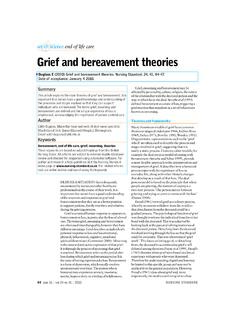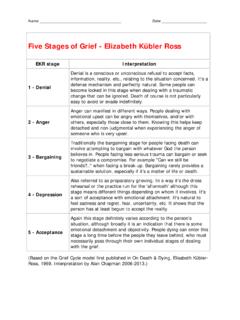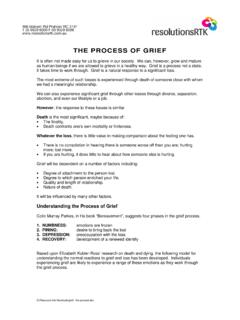Transcription of HELPGUIDE.ORG Coping with Grief and Loss
1 Trusted guide to mental, emotional & social health Coping with Grief and Loss Understanding the Grieving Process and Learning to Heal Coping with the loss of someone or something you love is one of life's biggest challenges. Often, the pain of loss can feel overwhelming. You may experience all kinds of difficult and unexpected emotions, from shock or anger to disbelief, guilt, and profound sadness. The pain of Grief can also disrupt your physical health, making it difficult to sleep, eat, or even think straight. These are normal reactions to significant loss. But while there is no right or wrong way to grieve, there are healthy ways to cope with the pain that, in time, can ease your sadness and help you come to terms with your loss, find new meaning, and move on with your life.
2 What is Grief ? Grief is a natural response to loss. It's the emotional suffering you feel when something or someone you love is taken away. The more significant the loss, the more intense your Grief will be. You may associate grieving with the death of a loved one which is often the cause of the most intense type of Grief but any loss can cause Grief , including: 1. Divorce or relationship breakup (/articles/ Grief /dealing-with-a-breakup- or- ). 2. Loss of health 3. Losing a job (/articles/ ). 4. Loss of financial stability 5. A miscarriage 6. Retirement 7. Death of a pet (/articles/ ). 8. Loss of a cherished dream 9. A loved one's serious illness 10. Loss of a friendship 11. Loss of safety after a trauma (/articles/ptsd- ). 12. Selling the family home Even subtle losses in life can trigger a sense of Grief .
3 For example, you might grieve after moving away from home, graduating from college, or changing jobs. Whatever your loss, it's personal to you, so don't feel ashamed about how you feel, or believe that it's somehow only appropriate to grieve for certain things. If the person, animal, relationship, or situation was significant to you, it's normal to grieve the loss you're experiencing. How to cope with Grief While experiencing loss is an inevitable part of life, there are ways to help cope with the pain, come to terms with your Grief , and eventually, find a way to pick up the pieces and move on with your life. 1. Acknowledge your pain. 2. Accept that Grief can trigger many different and unexpected emotions. 3. Understand that your grieving process will be unique to you.
4 4. Seek out face-to-face support from people who care about you. 5. Support yourself emotionally by taking care of yourself physically. 6. Recognize the difference between Grief and depression. The grieving process Grieving is a highly individual experience; there's no right or wrong way to grieve. How you grieve depends on many factors, including your personality and Coping style, your life experience, your faith, and how significant the loss was to you. Inevitably, the grieving process takes time. Healing happens gradually; it can't be forced or hurried and there is no normal timetable for grieving. Some people start to feel better in weeks or months. For others, the grieving process is measured in years. Whatever your Grief experience, it's important to be patient with yourself and allow the process to naturally unfold.
5 Myths and facts about Grief Myth: The pain will go away faster if you ignore it. Fact: Trying to ignore your pain or keep it from surfacing will only make it worse in the long run. For real healing, it is necessary to face your Grief and actively deal with it. Myth: It's important to be strong in the face of loss. Fact: Feeling sad, frightened, or lonely is a normal reaction to loss. Crying doesn't mean you are weak. You don't need to protect your family or friends by putting on a brave front. Showing your true feelings can help them and you. Myth: If you don't cry, it means you aren't sorry about the loss. Fact: Crying is a normal response to sadness, but it's not the only one. Those who don't cry may feel the pain just as deeply as others.
6 They may simply have other ways of showing it. Myth: Grief should last about a year. Fact: There is no specific time frame for grieving. How long it takes differs from person to person. Myth: Moving on with your life means forgetting about your loss. Fact: Moving on means you've accepted your loss but that's not the same as forgetting. You can move on with your life and keep the memory of someone or something you lost as an important part of you. In fact, as we move through life, these memories can become more and more integral to defining the people we are. The stages of Grief In 1969, psychiatrist Elisabeth K bler-Ross introduced what became known as the five stages of Grief . These stages of Grief were based on her studies of the feelings of patients facing terminal illness, but many people have generalized them to other types of negative life changes and losses, such as the death of a loved one or a break-up.
7 The five stages of Grief Denial: This can't be happening to me.. Anger: Why is this happening? Who is to blame? . Bargaining: Make this not happen, and in return I will ____.. Depression: I'm too sad to do anything.. Acceptance: I'm at peace with what happened.. If you are experiencing any of these emotions following a loss, it may help to know that your reaction is natural and that you'll heal in time. However, not everyone who grieves goes through all of these stages and that's okay. Contrary to popular belief, you do not have to go through each stage in order to heal. In fact, some people resolve their Grief without going through any of these stages. And if you do go through these stages of Grief , you probably won't experience them in a neat, sequential order, so don't worry about what you should be feeling or which stage you're supposed to be in.
8 K bler-Ross herself never intended for these stages to be a rigid framework that applies to everyone who mourns. In her last book before her death in 2004, she said of the five stages of Grief : They were never meant to help tuck messy emotions into neat packages. They are responses to loss that many people have, but there is not a typical response to loss, as there is no typical loss. Our grieving is as individual as our lives.. Grief can be a roller coaster Instead of a series of stages, we might also think of the grieving process as a roller coaster, full of ups and downs, highs and lows. Like many roller coasters, the ride tends to be rougher in the beginning, the lows may be deeper and longer. The difficult periods should become less intense and shorter as time goes by, but it takes time to work through a loss.
9 Even years after a loss, especially at special events such as a family wedding or the birth of a child, we may still experience a strong sense of Grief . Source: Hospice Foundation of America Symptoms of Grief While loss affects people in different ways, many of us experience the following symptoms when we're grieving. Just remember that almost anything that you experience in the early stages of Grief is normal including feeling like you're going crazy, feeling like you're in a bad dream, or questioning your religious or spiritual beliefs. Emotional symptoms of Grief Shock and disbelief Right after a loss, it can be hard to accept what happened. You may feel numb, have trouble believing that the loss really happened, or even deny the truth. If someone you love has died, you may keep expecting them to show up, even though you know they're gone.
10 Sadness Profound sadness is probably the most universally experienced symptom of Grief . You may have feelings of emptiness, despair, yearning, or deep loneliness. You may also cry a lot or feel emotionally unstable. Guilt You may regret or feel guilty about things you did or didn't say or do. You may also feel guilty about certain feelings ( feeling relieved when the person died after a long, difficult illness). After a death, you may even feel guilty for not doing something to prevent the death, even if there was nothing more you could have done. Anger Even if the loss was nobody's fault, you may feel angry and resentful. If you lost a loved one, you may be angry with yourself, God, the doctors, or even the person who died for abandoning you.

















